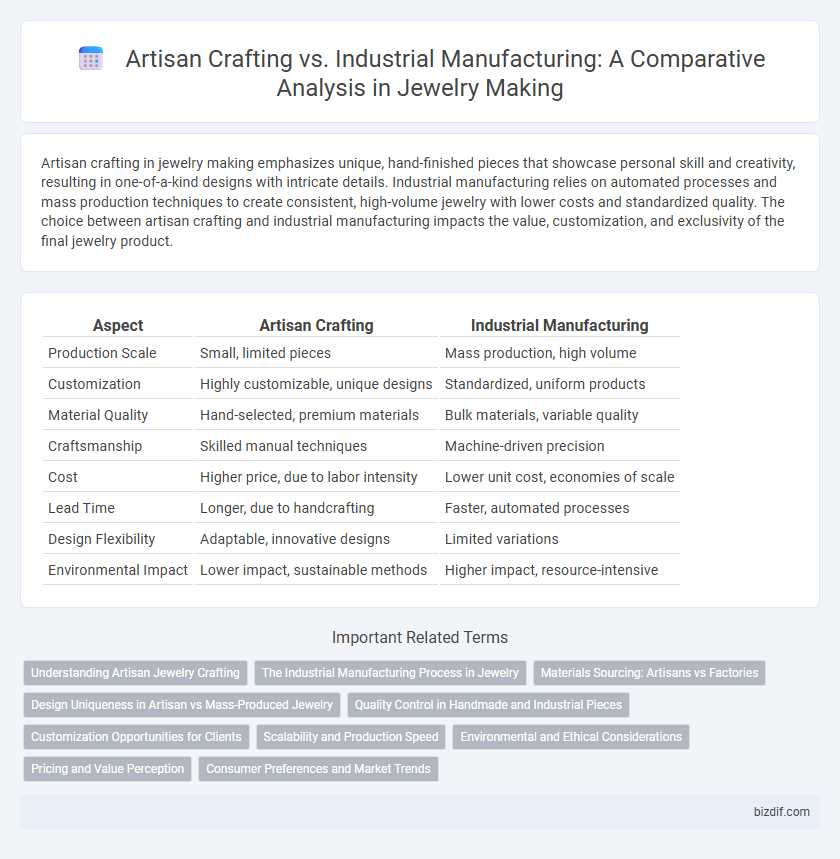Artisan crafting in jewelry making emphasizes unique, hand-finished pieces that showcase personal skill and creativity, resulting in one-of-a-kind designs with intricate details. Industrial manufacturing relies on automated processes and mass production techniques to create consistent, high-volume jewelry with lower costs and standardized quality. The choice between artisan crafting and industrial manufacturing impacts the value, customization, and exclusivity of the final jewelry product.
Table of Comparison
| Aspect | Artisan Crafting | Industrial Manufacturing |
|---|---|---|
| Production Scale | Small, limited pieces | Mass production, high volume |
| Customization | Highly customizable, unique designs | Standardized, uniform products |
| Material Quality | Hand-selected, premium materials | Bulk materials, variable quality |
| Craftsmanship | Skilled manual techniques | Machine-driven precision |
| Cost | Higher price, due to labor intensity | Lower unit cost, economies of scale |
| Lead Time | Longer, due to handcrafting | Faster, automated processes |
| Design Flexibility | Adaptable, innovative designs | Limited variations |
| Environmental Impact | Lower impact, sustainable methods | Higher impact, resource-intensive |
Understanding Artisan Jewelry Crafting
Artisan jewelry crafting involves meticulous handwork by skilled artisans, emphasizing unique designs and high-quality materials, which results in distinctive, one-of-a-kind pieces. This method prioritizes creativity, traditional techniques, and personal expression, contrasting with industrial manufacturing's mass production and standardized output. Artisan jewelry often incorporates techniques like hand engraving, stone setting, and metal forging, showcasing craftsmanship that cannot be replicated by automated processes.
The Industrial Manufacturing Process in Jewelry
The industrial manufacturing process in jewelry relies on advanced machinery, automation, and standardized techniques to produce large volumes of precise and consistent pieces efficiently. Utilizing methods like casting, stamping, and CNC machining, factories achieve high repeatability and intricate details with minimal manual intervention. This approach reduces production time and costs, enabling scalable distribution while maintaining quality control across extensive product lines.
Materials Sourcing: Artisans vs Factories
Artisan jewelry makers prioritize ethically sourced, often local or recycled materials, ensuring uniqueness and sustainability in each piece. In contrast, industrial manufacturing relies on bulk procurement from global suppliers to maximize consistency and cost-efficiency. This fundamental difference in materials sourcing significantly impacts the quality, environmental footprint, and exclusivity of the final jewelry products.
Design Uniqueness in Artisan vs Mass-Produced Jewelry
Artisan crafting in jewelry making emphasizes design uniqueness by incorporating handcrafted details, personalized touches, and one-of-a-kind aesthetics that reflect individual creativity. In contrast, industrial manufacturing relies on mass production techniques that prioritize uniformity and efficiency, often resulting in repetitive and standardized designs. This difference highlights how artisan jewelry captures distinctive artistry, while industrial pieces offer consistency across large volumes.
Quality Control in Handmade and Industrial Pieces
Artisan crafting in jewelry involves meticulous quality control through skilled hands, ensuring unique, intricate details and superior material selection. Industrial manufacturing relies on automated processes and standardized inspections to maintain consistent quality across large production runs. Handmade pieces often exhibit subtle imperfections that enhance their authenticity, while industrial pieces prioritize uniformity and durability through precision-engineered quality checks.
Customization Opportunities for Clients
Artisan crafting allows for unparalleled customization opportunities, enabling clients to collaborate closely with jewelers to create unique, personalized pieces tailored to specific tastes and styles. Industrial manufacturing, while efficient for mass production, offers limited customization options due to standardized designs and processes. Custom artisan jewelry often incorporates bespoke features such as hand-engraving, unique gemstone selection, and tailored metalwork, enhancing the overall value and individuality of each piece.
Scalability and Production Speed
Artisan crafting in jewelry making offers unparalleled attention to detail and unique designs but typically results in slower production speeds and limited scalability due to the manual techniques involved. Industrial manufacturing utilizes automated processes and machinery, enabling high-volume production with consistent quality and rapid turnaround times. This scalability advantage allows industrial methods to meet large market demands efficiently, while artisan crafting remains ideal for bespoke, high-value pieces.
Environmental and Ethical Considerations
Artisan crafting in jewelry making emphasizes sustainable sourcing of materials and reduced environmental impact through small-batch production, minimizing waste and energy use. Industrial manufacturing often relies on mass-produced components and synthetic materials, which can contribute to higher carbon emissions and resource depletion. Ethical considerations in artisan craftsmanship include fair labor practices and transparency, contrasting with industrial processes that may involve exploitative labor and opaque supply chains.
Pricing and Value Perception
Artisan crafting commands higher prices due to the uniqueness and meticulous handwork involved, enhancing perceived value among collectors and connoisseurs. Industrial manufacturing offers lower costs through mass production, appealing to broader markets but often perceived as less exclusive or valuable. Consumers prioritize artisan pieces for their craftsmanship and individuality, while industrial goods attract those seeking affordability and consistency.
Consumer Preferences and Market Trends
Artisan crafting in jewelry making emphasizes unique, handcrafted pieces with detailed artistry, appealing to consumers seeking personalized and exclusive designs. Industrial manufacturing offers mass-produced jewelry with consistent quality and lower costs, catering to budget-conscious buyers and fast-moving market demands. Current market trends show a growing preference for sustainable, ethically-made artisan jewelry, driven by increased consumer awareness and demand for authenticity.
Artisan crafting vs Industrial manufacturing Infographic

 bizdif.com
bizdif.com